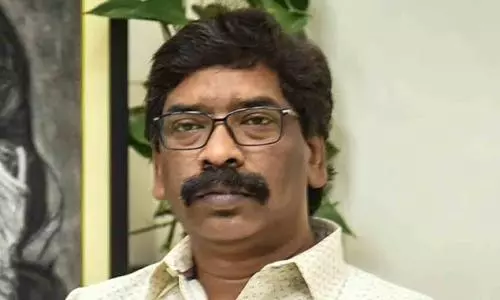
The future of Kashmir
text_fieldsThe Bharatiya Janata Party’s decision to withdraw from the coalition government with the Peoples Democratic Party (PDP) in Jammu & Kashmir is only something foreseen by all political observers.
The only question was when that would happen. The PDP and the BJP are two parties which are in totally opposite poles in almost all fundamental issues related to Kashmir such as Article 370 of the Indian Constitution that gives a special status to the state, the Armed Forces (Special Powers) Act (AFSPA) and more autonomy. There is only one answer as to how the BJP was able to form a coalition government with the PDP which is usually described as a ‘soft separatist’ organization: the greed for power. BJP shares power even in Meghalaya where it has only two members in the assembly. The Amit Shah theory of coming to power wherever, and in whatever ways, possible is what is behind the odd political alliance in Kashmir. Nonetheless, the nation on Tuesday witnessed its natural culmination. Thus, Kashmir is once again moving towards President’s rule. What is pertinent is how this will impact the state and the people.
The BJP-PDP coalition government came to power with Mufti Mohammad Sayeed as the Chief Minister on March 1, 2015. Following his death, daughter Mehbooba Mufti became the Chief Minister on April 4, 2016. The law and order situation in the state was at its worst during the period of the coalition government. The killing of Burhan Wani, the commander of the separatist organisation Hizbul Mujahideen, in July 2016 by the army paved way for the most violent clashes in the history of Kashmir. Thousands took to the streets. The number of people who gathered in different Kashmiri cities to take part in the funeral prayers for Burhan Wani was double the number of thousands who attended the funeral prayers for Chief Minister Mufti Mohammed Sayeed. This comparison is more than sufficient to gauge the actual picture of Kashmir. Without realizing all these aspects, the Central Government attempts handle Kashmir only in the light of the reports given by the army officers and security officials in Delhi. This is the blunder the Centre has been committing in managing the Kashmir issue. Today, the streets of Kashmir are strife-torn in a way unprecedented in history. The number of youths who favour the separatist organizations has also been on a rise.
Prominent journalist Shujaat Bukhari who was shot dead on June 14 had tweeted the following a few weeks back - ‘The authorities have to realize why this fear of death is missing in Kashmiri youth’. But the point is that those seated in Delhi never made efforts to realize that. They believe only in the trigger of the gun. That is the reason why 7 lakh soldiers are deployed there. If the ratio of military density in the civilian sector is considered, Kashmir region has the highest military presence in the world. According to government data, there are only 300 terrorists at the most in Kashmir. There is only one answer to the question as to what is the need of so many soldiers to deal with lesser number of terrorists. The governments who took power in turns see the entire Kashmiris as enemies. Regardless of the party which comes to power, what reigns in the state is military rule. The Sangh Parivar believes that Kashmir issue can be resolved only with the power of guns. When they are in power at the Centre, and that state comes under the central government’s rule, it is an easy guess as to what would happen there. In short, things are such that Kashmir is once again moving towards a volatile, violence-prone atmosphere.
Whatever justification the BJP might offer outwardly, it took this decision clearly with the 2019 Lok Sabha election in mind. In other words, it is not the future of a state or restoration of peace there, but political gains that forms the basis of all this. BJP might be calculating that it could face the election by sharpening the Kashmir confrontation and creating an atmosphere of frenzied nationalism. But what the Kashmir is losing by that will be a life of peace. Also, the BJP knows that since talking for the Kashmiris and for their human rights will be labeled as extremism, nobody will come forward to speak for them. In short, a situation is likely to emerge when the problem will get worse, and then the first casualties will be human rights and democracy. Speaking out about this fact in the current milieu is an extremely adventurous mission. But advocates of democracy have no option but to take up this mission.























